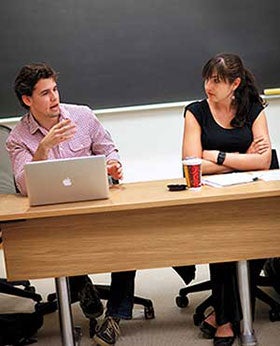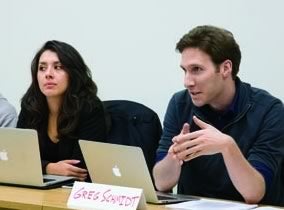Joint degree program seminar bridges law and public policy

Since the first meeting of the seminar taught by David Barron ’94 of Harvard Law School and Archon Fung of Harvard Kennedy School, students had been using case studies co-authored by the two professors that put them in the situation room with advisers on real-world problems at the intersection of law and policy.
But during a session of Public Problems Advice, Strategy and Analysis in November a player in the case they were discussing sat at the table with them: Josh Stein. J.D. /M.P.P. ’95, North Carolina state senator and Democratic minority whip, who had first-hand experience with an innovative but contentious piece of legislation: The North Carolina Justice Act.
Passed in 2009, the act allowed prisoners on death row to challenge their sentences “on the basis of race” and to draw on broad statistical evidence of bias. By early 2012, a judge had commuted the sentence of one of the state’s death row inmates to life without parole (the act’s remedy) and nearly all other North Carolina death row prisoners had filed challenges. But in June 2012, the Republican-dominated State legislature radically narrowed the statute.
The course—the bridge seminar for the Harvard joint degree program in law and government—aims to teach students to give advice on issues that have both legal and policy dimensions but also to understand the stakes for the institutions involved. Stein, who had just been elected to his third term in the North Carolina General Assembly, engaged students in a candid discussion of the twists and turns in the act’s evolution and the legislative process that led to its passage—and its eventual curtailment.
In a down-to-earth style, he described the complicated dance between the overlapping but not identical interests of the act’s supporters (including anti-death penalty activists and members of the NAACP) in a state that has been struggling with a legacy of racially flawed prosecutions while remaining strongly pro-capital punishment.
As Fung and Barron asked key questions, it emerged that when the act was first drafted, it contained no remedy. The already energetic discussion came to a boil. One student argued that without a remedy it wasn’t primarily anti-death penalty legislation, but had more to do with fairness—like a truth and reconciliation commission. Another student said that wouldn’t do much for those on death row: “If it’s a statement, there are better ways to make it.” Others speculated that activists must have hoped the legislation would make it through without a remedy, to allow leeway for resentencing and possible eventual release.
Stein replied frankly, describing the reality of state politics in general and North Carolina’s in particular. When he was elected to the Senate in 2008, he was one of 30 Democrats and 20 Republicans. By 2010, he became the Democratic Senate minority whip after his party lost 11 seats in that chamber. Barron passed around a copy of a mailer that targeted a politician who had supported the act.
Barron said that having Stein in the class provided a window into how legislators think, which is often hard to access. Other guests included HLS Professor Daniel Meltzer ’75, former principal White House counsel, who helped to teach a case on the Defense of Marriage Act. Last year Mary DeRosa, former deputy counsel to President Obama and National Security Council legal adviser to the president, taught a case on the executive order to close Guantanamo.
Barron himself served in the Obama administration as acting head of the Justice Department’s Office of Legal Counsel. He said it was that experience that made him want to teach this seminar.
“Nothing convinces you more of the need to have people give you good legal advice than having to make decisions,” he said. “You realize how dependent you are on people who are advising you. I wanted to make sure our students focus attention on what it means to provide advice in these complex public settings.”
Ruthzee Louijeune J.D./M.P.P. ’14 said having Stein in the class was enormously valuable, because of the questions he answered and others that he raised: “How do you hold onto the ideas that you want to promote but still recognize the limitations of the structures in which you want to effect change?” she asked. “It was sobering,” said Louijeune, “but really good information to have about what it’s like to work in the political framework to advance a cause when you are in the minority.”

In addition to the joint degree candidates, the class also included students from both schools who have related work, such as the LL.M. candidate who is an adviser to the deputy prime minister in Australia or the Kennedy School student who was a political consultant to the Mexican government.
Matt Ivey LL.M. ’13, an active duty Navy JAG officer, praised the applicability of the course to the work he has done in the military and the lawyering he hopes to do in the future. “A lot of law school classes are from the 5,000-foot level,” he said. “This class brings us back down to the ground from where most of us will probably start or continue our practice.”
Ryan Rippel ’12, who took the class last year, says he often applies its lessons in his work for the Bill and Melinda Gates Foundation. Rippel is now focused on “participatory slum upgrading in five cities in Africa,” trying to get the cities to be more responsive to the needs of the urban poor and to help those living in slums organize themselves to have a voice in local decision-making to secure domestic resources.
“A lot of my work begins with looking at law,” he said, “but what the class made very clear is that you need to understand the context in which the law is operating. That requires some sense of politics, the economy and the markets. But more than anything it requires a sense of the personality of the decision-makers and the various constituencies you are trying to partner with.”
Rippel, too, has now taught a public problems course—this January at the Washington University Law School in St. Louis. He calls Barron and Fung’s class a remarkable offering and hopes other law schools will adopt “this kind of interdisciplinary approach to legal education so relevant to today’s world and the work that lawyers are actually doing.”